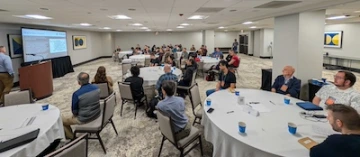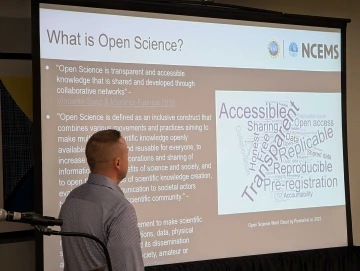Newest Synthesis Center Focuses on Open Science Using CyVerse
NCEMS Summit in Chicago Convenes 120 Researchers in Molecular and Cellular Science

The National Synthesis Center for Emergence in the Molecular and Cellular Sciences (NCEMS, NSF’s newest synthesis center), headquartered at Penn State University, is holding its first Summit in Chicago, Oct ober 6-9, 2024.

Convening 120 researchers from 61 institutions and 6 countries, the NCEMS Summit is intended to identify the most critical questions surrounding emergent phenomena in molecular and cellular systems. Working at the scale between molecules and cellular organelles, NCEMS seeks to support the community in carrying out team and open science, using team partner CyVerse for computational and open science capabilities and cloud-agnostic cyberinfrastructure for collaboration.
NCEMS joins the Environmental Data Science Innovation and Inclusion Lab (ESIIL), headquartered at University of Colorado Boulder, as the second Synthesis Center for Biology supported by CyVerse in the last three years. A third NSF Synthesis Center is currently under review by the NSF in Plant Sciences and will be announced in the next year.

In the month prior to the Summit, CyVerse co-PI and Director of Open Science Tyson Swetnam provided four sessions to 40 early-career NCEMS Summit participants. Starting with putting Open Science principles into practice, Swetnam moved quickly into the nitty-gritty of using CyVerse to manage and share huge or existing datasets, to project management, governance and communications to encourage collaboration, to version control of code to run analyses that are reproducible by others, all hugely important to NCEMS’ success.
“Team science is at the heart of NCEMS’ approach to synthesis research, so including CyVerse as a partner made perfect sense to enable our community to start tackling the mesoscale questions that synthesis centers were intended to solve, ” said NCEMS Director, Ed O’Brien of Penn State University. O'Brien said NCEMS anticipates annual Summits for the next 5 years of its funding, with nationwide opportunities to participate in research remotely as well.

